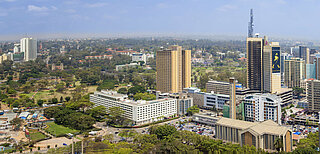Making cities sustainable

Urban areas are essential to successful climate mitigation. Therefore, IKI has started to support sustainable urban development as a cross-sectoral funding priority as early as 2015.
Cities are home to more than half of the world's population - a snapshot of long-term urbanisation: Whereas in 1955 only 30 percent of the world population lived in cities, experts estimate that this proportion will rise to just under 70 percent by 2050. This rapid growth will take place mainly in conurbations in emerging and developing countries.
Cities are particularly sensitive to the impacts of climate change
Cities are responsible for more than two-thirds of the world's human-made CO2 emissions. A large part of these emissions is caused by burning fossil fuels. The construction of infrastructures and the sealing of land used for transport and housing threaten biodiversity. Cities are particularly sensitive to the impacts of climate change due to their high population density and a large number of economic assets. Most urban areas are located on coasts. Therefore, they are particularly affected by rising sea levels. Cities are faced with the challenge of providing sufficient financial resources to cope with phenomena such as more frequent heavy rainfall and flooding or periods of extreme heat and cold. Risks need to be mitigated and infrastructures built. This requires decision-making powers, capacities, and appropriate knowledge at the city level. Besides, it makes sense to focus on synergies with existing political goals such as poverty reduction or the reduction in traffic volume.
The city of the future will be digital, resilient, and liveable
Urban development is a central task for climate mitigation and the conservation of biodiversity. The Paris Agreement explicitly recognises cities and subnational governments as key actors. The importance given to cities in the Paris Agreement is also reflected in SDG 11 ("Make cities and human settlements inclusive, safe, resilient and sustainable") of the 2030 Agenda. At the UN Habitat III Summit in 2016, the countries agreed on a New Urban Agenda (NUA) defining specific goals for sustainable urban development. The International Climate Initiative (IKI) made sustainable urban development a cross-sectoral funding priority as early as 2015.
IKI projects support their partner countries in developing strategies for sustainable and climate-friendly urban development and for dealing with the impacts of climate change on cities. The fields of action of these projects are in the energy, water, waste, air pollution control, and mobility sectors, as well as in the area of improving the quality of life in connection with healthy ecosystems and ecosystem services. The priorities in climate change mitigation include support for the development of climate action plans, the vertical integration of local climate change mitigation activities into national climate change mitigation policies, and the provision of financing solutions for infrastructure investments. Adaptation projects aim at strengthening local resilience to the impacts of climate change. In the field of biodiversity, for example, the focus is on integrating National Biodiversity Strategies and Action Plans (NBSAPs) into sustainable urban planning.
The link has been copied to the clipboard
Contact
IKI Office
Zukunft – Umwelt – Gesellschaft (ZUG) gGmbH
Stresemannstraße 69-71
10963 Berlin



